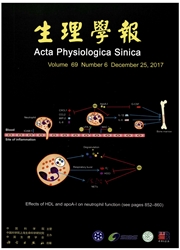

 中文摘要:
中文摘要:
本研究旨在观察急性应激刺激对癫痫模型大鼠慢性期癫痫发作的影响。首先建立了氯化锂(LiCl)-匹罗卡品(pilocarpine,PILO)癫痫大鼠模型,在其慢性自发反复发作期给予猫尿和足部电刺激类急性应激刺激,检测应激刺激前后癫痫模型大鼠的行为学表现以及癫痫发作行为。结果显示,癫痫模型大鼠在猫尿刺激之后自发活动明显减少,危险评估活动增多,但是连续观察45min无癫痫发作。给予癫痫模型鼠足部电刺激也未诱发其癫痫发作。与此相反,与对照组相比,腹腔注射低剂量的戊四氮(pentylenetetrazole,PTZ,30mg/kg),在癫痫模型鼠更容易诱发癫痫发作,而且其发作时间也明显延长。以上结果表明猫尿或者足部电刺激虽然导致癫痫模型大鼠的应激行为,但是不足以在短时间内诱发其癫痫发作。
 英文摘要:
英文摘要:
This study was undertaken to observe the effect of acute stress on seizure occurrence in chronic period of epileptic model rats. Lithium-pilocarpine (LiCl-PILO)-induced epileptic rat model was constructed. At the spontaneous recurrent seizure period, acute stress stimulations such as cat’s urine and foot electrical shock were applied to observe the behavioral changes and seizure occurrence. The results showed that after the cat’s urine stimulation, the self-directed behaviors of the epileptic model rats decreased significantly, while the risk assessment behaviors increased significantly. The seizure occurrence, however, was not observed during the 45 min after the stimulation. Applying electrical foot shocks also did not evoke seizures in epileptic model rats. On the contrast, intraperitoneal injection of low dose of pentylenetetrazole (PTZ, 30mg/kg) evoked seizure more efficiently, and the duration of seizure activity was extensively prolonged in epileptic model rats than that of control rats. Taken together, these results indicate that although applying stress stimulations such as cat’s urine and electrical foot shock cause several behavioral changes, they are not severe enough to evoke seizure in epileptic model rats.
 同期刊论文项目
同期刊论文项目
 同项目期刊论文
同项目期刊论文
 期刊信息
期刊信息
